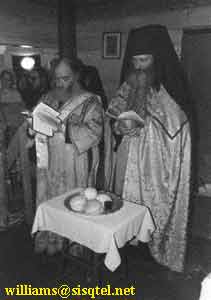 |
|
Creation, God and Modern Scientists
[Fr. Seraphim] showed that all the Fathers
taught that the first man Adam and likewise the first creatures “appeared in a
way different from all their descendants”: they appeared not by natural
generation but by the word of God....
“The doctrine of evolution attempts to
understand the mysteries of God's creation by means of natural knowledge and
worldly philosophy, not even allowing the possibility that there is something
in these mysteries which places them beyond its capabilities of knowing: while
the book of Genesis is an account of God's creation as seen in Divine vision
by the God-seer Moses, and this vision is confirmed also by the experience
of later Holy Fathers....
“I believe that modern science in most cases
knows more than St. Basil, St. John Chrysostom, St. Ephraim, and other Fathers
about the properties of fishes and such specific facts; no one will deny this. But
who knows more about the way in which God acts: modern science, which is
not even sure that God exists, and in any case tries to explain everything
without Him; or these God-bearing Holy Fathers?” (p. 518-519)
The Knowledge of Modern Science and the
Knowledge of Adam
“The state of Adam and the first-created world,”
Fre Seraphim wrote, “has been placed forever beyond the knowledge of science
and by the barrier of Adam's transgression, which changed the very nature of
Adam and the creation, and indeed the very nature of knowledge itself. Modern
science knows only what it observes and what may be reasonably inferred
from observation.... The true knowledge of Adam and the first-created world –
as much as is useful for us to know – is accessible only in God's revelation
and in the Divine vision of the saints.” (p. 519)
Fr. Seraphim's Education for the Young
... he was receiving his education from Fr.
Seraphim, who took time out to instruct him in the necessary subjects, from
history to world literature. With his great love for the stars, he bought a
telescope so he could teach astronomy to Theophil and other boys. Over the
years Fr. Seraphim was even to teach Theophil how to read and translate the
Divine Services from Church Slavonic. (p.532-533)
Reading Requirements at Platina
The books read in church were all of monastic
inspiration: The Lausaic History, The Ladder of Divine Ascent, the Spiritual
Counsels of Abba Dorotheos, and the account of St. Pachomius and his
disciples (found in The Paradise of the Fathers). According to
tradition, the Homilies of St. Ephraim the Syrian were also to be red
during the services, but since no English translation was available, the
fathers substituted a classic text of Western Orthodoxy, the Dialogues
of St. Gregory the Great. For their private spiritual reading, the brothers
read such books as Unseen Warfare, the Institutes of St. John
Cassian, the Rule of St. Pachomius, and The Northern Thebaid.
Fr. Seraphim, as we have seen, tried to reread Blessed Augustine's Confessions
every Lent, in addition to other books. (p. 568)
The Presuppositions for “An Orthodox Survival
course”
“This course will concentrate on the most
important movements and most important writers who helped form the mentality
which we have today. If one is not aware of all this, one can still be
Orthodox, of course, but one is running a great danger, because the movements
of thought around one, which have been formed over the last eight centuries,
affect one directly, and one cannot know how to answer them without knowing
where they are right, where they are wrong, and how they have arisen. One can
be in a very precarious position, even in the position of an 'Orthodox
fundamentalist' who simply sits in his corner and says, 'Oh, I believe this and
everything else is evil.' This, of course, is very unrealistic because you have
to have contact with the world: your children are going to school, you read
newspapers, you have contact with people who believe different things and even
with Orthodox people who don't know what they believe. If you are not aware of
what's going on, your Orthodoxy will be infected, without your even knowing it,
by all kinds of modern ideas. You will be going to church on Sunday, and the
rest of the week living by some kind of different standard, which can be
disastrous.... In order to avoid this we must follow the advice of St. Basil
(the Great) and begin to learn to take from the world around us wisdom where
there is wisdom, and where there is foolishness to know why it it is
foolishness.” (p. 588-589)
Metaphysics of the Western Mind
Quoting at length from Kireyevsky's philosophy,
Fr. Seraphim traced the modern apostasy, which began with the Schism of Rome,
to a special characteristic of the Western mind: the conviction that outward
rationalism outweighs the inwards essence of things. (p. 590)
Thinking in the Middle Ages
In the Scholasticism of the Middle Ages,
Christian teaching becomes “systematized” and subordinate to logic. As Fr.
Seraphim observed, “logicalness becomes the first test of truth, and the
living sources of faith second. Under this influence, Western man loses a
living relationship to truth. Christianity is reduced to a system, to a human
level.... It is an attempt to make by human efforts something better that
Christianity. Anselm's proof of God's existence is an example – he is
'cleverer' than the ancient Holy Fathers.” (p. 591)
The “Charismatic Revival” is Not the Spirit of
Orthodoxy
In the concluding chapter of [“Orthodoxy and
the Religion of the Future”], Fr. Seraphim acknowledged that “there may be
those who will doubt that the 'charismatic revival' is a form of mediumism;
that is only a secondary question of the means or technique by which the
'spirit' of the 'charismatic revival' is communicated. But that this 'spirit'
has nothing to do with Orthodox Christianity is abundantly clear. (p. 648)